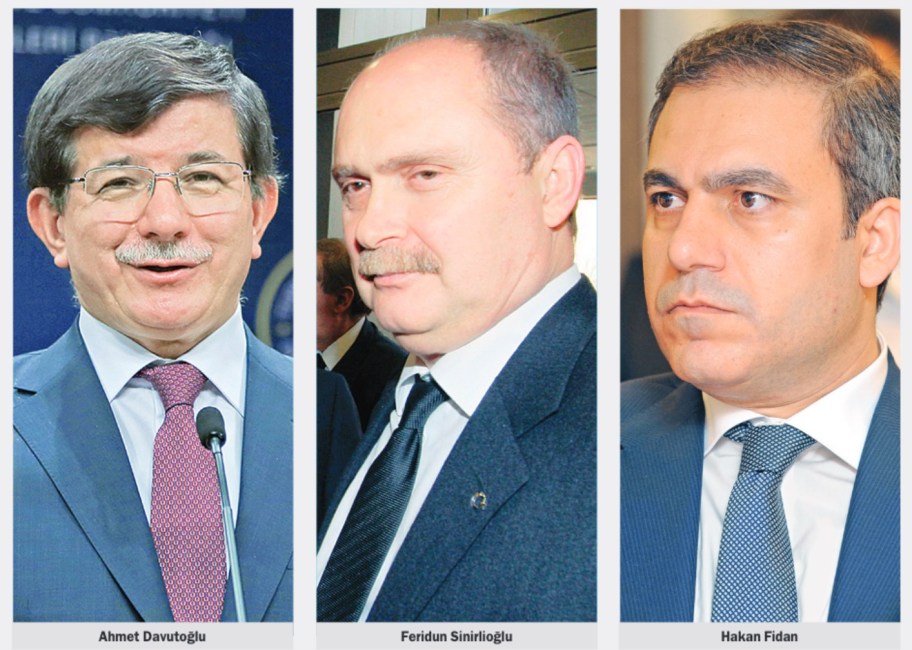A Turkish court recently confirmed the authenticity of a leaked audio clip in which top-ranking Turkish officials are heard discussing the possibility of an intervention in Syria in a false flag operation conducted by Turkish intelligence agency MİT.
In the leaked recording, then-Foreign Minister Ahmet Davutoğlu, then-Foreign Ministry Undersecretary Feridun Sinirlioğlu, MİT Undersecretary Hakan Fidan and then-Deputy Chief of General Staff Gen. Yaşar Güler are heard discussing military operations in Syria in Davutoğlu’s Foreign Ministry office on March 13, 2013.
Fidan says in the recording: “If needed, I would dispatch four men to Syria. [Then] I would have them fire eight mortar shells at the Turkish side and create an excuse for war.”
The judicial confirmation of the scandalous content was inadvertently revealed when the public prosecutor tried to pin the leak on a group critical of the government of President Recep Tayyip Erdogan as part of espionage charges. The statements in the leak, included in the indictment as allegations, were formally confirmed by the Ankara 4th High Criminal Court in a reasoned decision that was announced on Jan. 16, 2019.
“A top-secret meeting was held at the Foreign Ministry with the participation of the minister, his undersecretary, the MİT undersecretary and the deputy chief of general staff. The conversation in the meeting was illegally recorded for reasons of political and military espionage, and the recordings were posted online. The Ankara Chief Public Prosecutor’s Office launched this espionage case on March 27, 2014 in investigation file No. 2014/47602,” the court said in its ruling.

The investigation of the leak was turned into an indictment on June 6, 2016 under file No. E.2016/24769, and the same allegations were included in the indictment. The Ankara court announced its decision on Feb. 17, 2017 but postponed the publication of its reasoned decision until January 2019.
The authenticity of the recording had previously been confirmed by Turkish officials, but the judicial review of the allegations and the court’s acceptance of the charges of the prosecutor in its reasoned decision could land the Erdogan government in hot water internationally and might help build a case against his government in the future for fueling the civil war in Syria.
The court underlined that the seven minute, seven second clip was obtained through audio surveillance of the meeting attended by the foreign minister and military and government officials. “It is obvious that the conversations in the audio are information that needed to be kept secret and are considered to be a state secret,” it said.
In July 2015 German weekly magazine Focus published a report on an audio recording of a high-level security meeting at the Turkish Foreign Ministry concerning possible military action in Syria by means of a false flag operation that was recorded and then leaked by the US National Security Agency (NSA).
The Turkish government blamed the leak on the Gülen movement, a civic group that is highly critical of the Erdogan government, although the investigation failed to provide any evidence to that effect and found nobody from the group who might have been involved in the leak. In fact, the recording exposed major security flaws in the ministry as its CCTV system and jamming devices were not sufficient to prevent illegal recordings. The then-Ankara deputy public prosecutor Veli Dalgalı submitted a file to the Ankara Public Prosecutor’s Office on July 9, 2014, saying the perpetrators were unable to be identified with the available evidence. The details of the file reveal that even the basic security measures required to be in place where top secret meetings are held were not taken.


Prosecutor Dalgalı’s investigation reveals there was only one CCTV camera in the hall where the meeting was held and that it covers only the entrance of the hall and the elevator. Jamming devices used to prevent mobile devices from working during meetings were also not properly operating at the time of the meeting. Dalgalı said in his written report that the leaked audio recording might have been made in the meeting room by means of a recording device or bugging device that could be affixed to a wastebasket, remote, multipurpose plug or easily portable items. Dalgalı noted that after exhaustive searches of the meeting room by the National Intelligence Organization (MİT), it was clear that the audio was not recorded from outside through an audio surveillance system but from inside the meeting room.
At the urging of the government, Turkish prosecutor Dalgalı derailed the probe, did not investigate the illegal schemes plotted among officials in violation of Turkish law and hushed up the investigation when he could not identify the leaker. As a reward, he was promoted to membership of the 5th Chamber of the Supreme Court of Appeals. Dalgalı is also one of the prosecutors who helped whitewash a massive corruption case involving German-based Turkish charity Deniz Feneri e.V., which was run by people close to Erdogan. The probe into Deniz Feneri’s fraudulent connections to Turkey began in 2008. The Deniz Feneri administration was accused of funneling money collected for charity from workers in Germany into various companies and businesses in Turkey. The Frankfurt State Court sentenced three Turkish nationals to prison terms of up to six years on Sept. 17, 2008 for involvement in embezzling and misusing donations totaling 17 million euros. The prosecutor in the case announced that there were suspicions of possible connections to the case in Turkey. The Erdogan government helped derail the probe on the Turkish side and freed all suspects named in the indictment.
Following the leak of the audio recording, the Turkish government banned YouTube in March in the face of the revelations, while the opposition accused the government of planning a “provocation” involving Syria that had been exposed on social media. “Now they have banned YouTube to prevent the world from learning about it. They know they would be considered war criminals,” Gursel Tekin, then-deputy chairman of the main opposition Republican People’s Party (CHP), said. The YouTube ban was lifted in June 2014 after the country’s highest court ruled that the two-month ban on the video-sharing website violated freedom of expression.
 Then-prime minister and current president Erdoğan confirmed the security meeting at a public rally in the city of Diyarbakır, saying that the wiretapping of his foreign minister’s office was “immoral,” an act of “cowardice,” “dishonest” and “mean.” Then-Turkish President Abdullah Gül, also an Islamist, sided with Erdogan and strongly condemned the audio surveillance and leaking of the conversation, calling it an act of espionage. Instead of questioning the false flag that would drag NATO’s second largest army into a war in Syria, he said: “This is an act of espionage against Turkey’s security. Those who took part in this, those who contributed to it, will definitely be exposed [and] will be, as prescribed by law, harshly punished.”
Then-prime minister and current president Erdoğan confirmed the security meeting at a public rally in the city of Diyarbakır, saying that the wiretapping of his foreign minister’s office was “immoral,” an act of “cowardice,” “dishonest” and “mean.” Then-Turkish President Abdullah Gül, also an Islamist, sided with Erdogan and strongly condemned the audio surveillance and leaking of the conversation, calling it an act of espionage. Instead of questioning the false flag that would drag NATO’s second largest army into a war in Syria, he said: “This is an act of espionage against Turkey’s security. Those who took part in this, those who contributed to it, will definitely be exposed [and] will be, as prescribed by law, harshly punished.”
The political opposition did not buy Erdogan’s argument, either. “They [the government] want to drag Turkey into a war [in Syria]. [They are] working on plots to win international legitimacy [in the case of a Turkish intervention in Syria],” Kemal Kılıçdaroğlu, leader of the CHP, said. Then-independent Kütahya deputy İdris Bal said the leaking of the conversation served the national interest. “In the final analysis, this [leaking] represents the exposure of a dirty game [and] is good in that context,” he added.
The conversation in the audio recording also focuses on whether the Turkish military should enter Syria to protect the tomb of Suleiman Shah, the grandfather of Sultan Osman I, founder of the Ottoman dynasty. The tomb used to be located at Jaber Castle, a historic fortification within Syria’s borders and a highly sensitive location protected by a Turkish army contingent. It was later moved to another location after the castle was flooded due to dam construction. In early 2015 Turkey moved the tomb 22 kilometers (14 miles) west of Kobani to protect it from the threat posed by the Islamic State in Iraq and the Levant (ISIL).
According to the Treaty of Ankara, which was signed on Oct. 20, 1921 between colonial power France and the Turkish Parliament, the compound housing the tomb of Suleiman Shah is considered Turkish territory. The 2003 protocol between Turkey and Syria gave Turkey transit rights through Syrian territory to access the tomb in order to maintain and repair it.
The Turkish Foreign Ministry issued a statement regarding the audio at the time, saying the recording of the highly sensitive meeting attended by people who are responsible for the security of Turkey was leaked to social media and claimed that it had been tampered with. In an attempt to spin the story, the Foreign Ministry said the senior officials were meeting to make a contingency plan in the event of an attack on the tomb of Suleiman Shah, and it reaffirmed Turkey’s determination to defend the tomb.
Yet Turkish court documents, revealed in January 2019, did not include any claim of tampering and did not support the Foreign Ministry’s statement, which was an apparent attempt to contain the damage and manipulate the leak.

In the recording the voice of Davutoğlu can be heard saying that the “prime minister said this [Jaber Castle] must be considered an opportunity at this juncture.” Two weeks before the leak, clashes between opposition groups — specifically, the Free Syrian Army (FSA) and ISIL — had intensified in the region around the castle. The news that ISIL had taken control of a town near it prompted immediate reactions from Turkish officials. When in the recording Fidan asked why they were being persistent on pushing an attack on the tomb of Suleiman Shah, Davutoğlu responded by saying that the pretext for an incursion must be acceptable to the international community.
The Turkish foreign minister also said, “Without a strong pretext, we cannot tell US Secretary of State [John] Kerry that we need to take extraordinary measures.” Davutoğlu added that Kerry had asked him whether Turkey was determined to strike Syria. According to the audio file, Fidan said: “If needed, I would dispatch four men to Syria. [Then] I would have them fire eight mortar shells at the Turkish side and create an excuse for war. We can have them attack the tomb of Suleiman Shah as well.”
Then-Foreign Ministry Undersecretary Sinirlioğlu, who currently serves as Turkey’s ambassador to the United Nations, was also recorded as saying that Turkey’s national security had turned into cheap material for domestic political consumption. Gen. Güler warned, “What we are going to do is a direct reason for war.”
The recent decision that verified the content of the recording was made in case No. 2016-238 by the Ankara 4th High Criminal Court, which has also tried suspects over their affiliation with government critic Fethullah Gülen, a Turkish Muslim cleric who has been living in exile in the United States since 1999.
Source: Nordic Monitor



